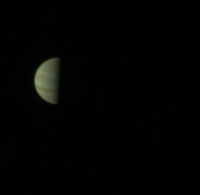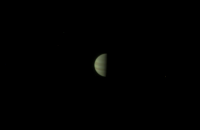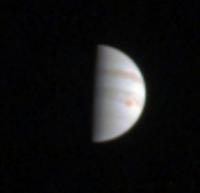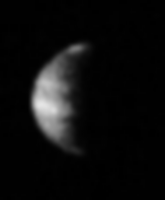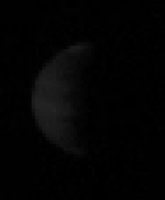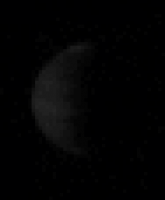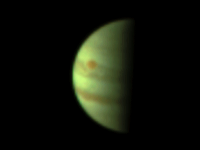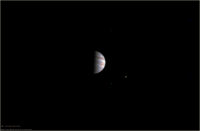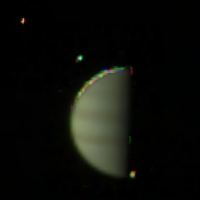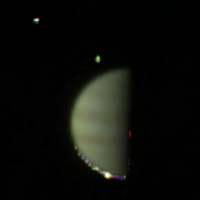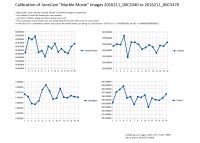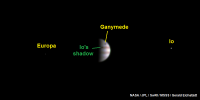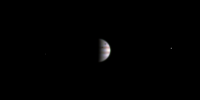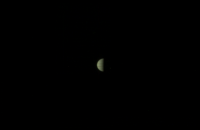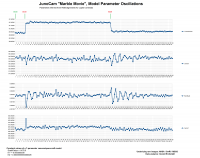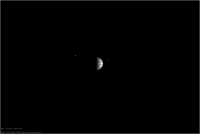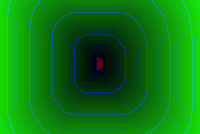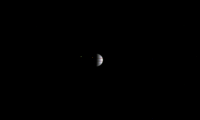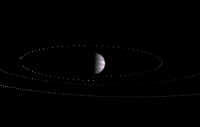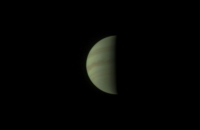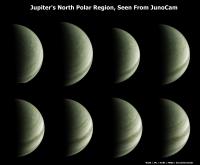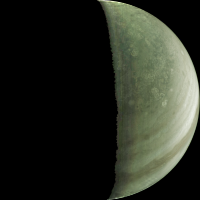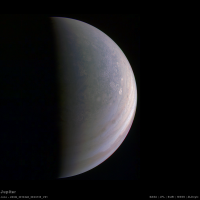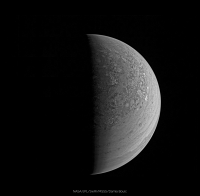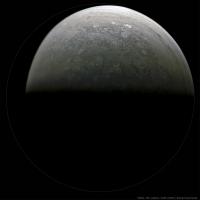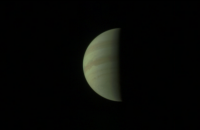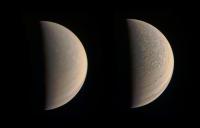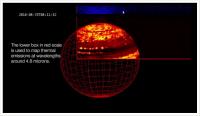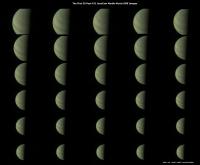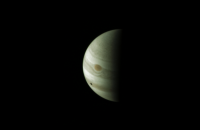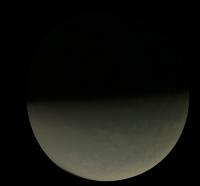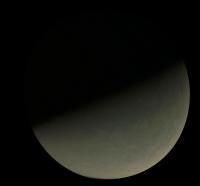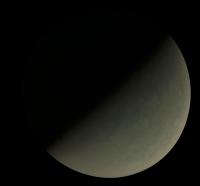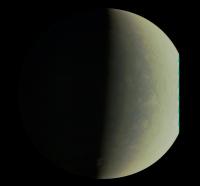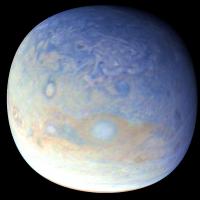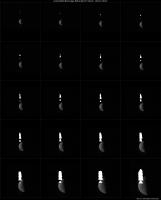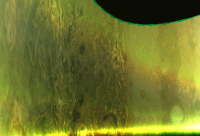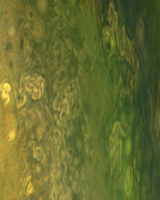Printable Version of Topic
Click here to view this topic in its original format
Unmanned Spaceflight.com _ Juno _ JunoCam "Marble Movie"
Posted by: elakdawalla Aug 9 2016, 09:13 PM
Almost 900 MB of "Marble Movie" data now available: https://www.missionjuno.swri.edu/junocam/processing
Posted by: elakdawalla Aug 9 2016, 09:49 PM
The newly released Marble Movie data cover 10 Jul to 28 Jul. For the most part, images are taken every 15 minutes. Until 16 July it alternated RGB and blue, after that it's just RGB. Every two days beginning July 17, there is a methane filter image. There are two gaps in the data, one between 13 Jul 17:00 and 14 Jul 02:15, and the other from 14 Jul 13:00 to 14 Jul 20:15.
Posted by: mcaplinger Aug 9 2016, 11:08 PM
Note that unlike the approach movie images, which had to be full-spin 82-frame images, now that we're in orbit we are able to use "nadir mode" which times the image acquisition based on s/c attitude knowledge of when Jupiter is in the FOV. This reduces the data volume a lot, but has the unhappy side effect of splitting the planet across two green framelets for most of the RGB images, which makes processing a bit harder depending on how one does it.
Posted by: Gerald Aug 9 2016, 11:35 PM
That's the output of my first out-of-the-hip calibration test run, starting with a wild guess of the camera parameters:
The second iteration run should provide better-centered images.
Posted by: Gerald Aug 10 2016, 01:07 AM
A very first taste of an animated version with 6 frames showing the Great Red Spot:
Posted by: Gerald Aug 10 2016, 05:01 AM
I've uploaded http://junocam.pictures/gerald/uploads/20160810/ (a zip with about 250 MB).
After the sequence up to image 2449, covered by the zip, Juno's spin axis changed a bit. This required an adjustment of the processing parameters.
It's the kind of x-coordinate coverage with which I hope to be able to narrow down the remaining degrees of freedom in my camera model.
The processing of the remaining color images is still running. I'll upload the results later, in a few hours.
Posted by: wildespace Aug 10 2016, 08:50 AM
A derivative version from the last frame in that zip, with colours auto-balanced and north up:
Credit: NASA / JPL-Caltech / SwRI / MSSS / Gerald Eichstädt / Maksim Kakitsev
Posted by: Gerald Aug 10 2016, 12:29 PM
I've added http://junocam.pictures/gerald/uploads/20160810/ (about 24 MB).
The first half is good. In the second half, there is some misalignment, wobbling and flickering. To treat this, I'll likeley need to apply a more time-consuming reprocessing.
Edit: The remaining preliminary stills of the AVI are now online.
I've skipped image 2450, since it requires parameters specific to this image, which are TBD.
Posted by: PaulH51 Aug 11 2016, 12:23 AM
Wonderful animation Gerald, seeing the orbiting moons made it special for me
Posted by: Gerald Aug 11 2016, 11:41 AM
Thanks Paul, for finding time to have a look at the Juno mission! ![]()
This enhanced version of JunoCam's first "methane" image of Jupiter
shows bright regions near the poles, as well as bright bands closer to the equator.
The image is derived from a crop of the raw image
and enhanced as sketched in this animated gif:
The brightest pixel is in the northern (lower) bright band near the equator. Since it's only one pixel, it may be noise. If it's a real feature, it's not in the neighborhood of to the Great Red Spot
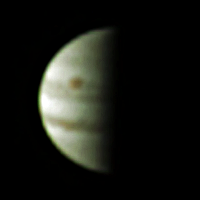
This gif contains enhanced frames of immediately before and after the methane image, a strongly enhanced version of the methane image in-between, and the Great Red Spot image:
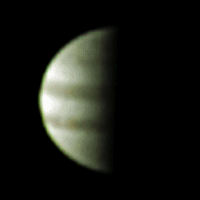
Posted by: Gerald Aug 11 2016, 01:31 PM
The first 81 color frames of the "Marble Movie", linearized to enhance cloud band structure, and cropped around Jupiter, as a lossy gif preview:
The stills of this gif are derived from the zipped stills I've uploaded yesterday.
... I'm preparing an AVI of better quality for the "Marble Movie" RGB images until JNC image #2449.
Posted by: Gerald Aug 11 2016, 02:24 PM
The AVI, white-balanced version:  junocam_marble_movie_until_frame2449_crop_lin_white.avi ( 524.7K )
: 525
junocam_marble_movie_until_frame2449_crop_lin_white.avi ( 524.7K )
: 525
Interestingly, the file is of better quality than the gif, contains a lot more (602) frames, but it's of smaller file size.
Posted by: mcaplinger Aug 11 2016, 03:32 PM
This looks really good. You might consider rotating it so north is up.
Finding better ways of enhancing the moons without bringing up the noise background is something we spent a fair bit of time on. I found that masking the planet and then linearly stretching the background worked OK, though if you make the mask too large you cut off the moons near the planet and if you make it too small you end up with a ring of stray light around the planet.
BTW, the planet gets very small but marble movie becomes interesting later on as the spacecraft approaches the equatorial plane and you can see the moons' motion become more and more linear.
Posted by: Gerald Aug 11 2016, 04:54 PM
Thanks!
Here the north-up version: junocam_marble_movie_until_frame2449_crop_lin_white_rot180.avi ( 523.55K )
: 477
junocam_marble_movie_until_frame2449_crop_lin_white_rot180.avi ( 523.55K )
: 477
I may implement and test some moon-enhancement versions later today. The log-version I've posted for the Jupiter Approach movie was intended to ensure, that no information gets lost on the level of the darkest colors. But specific for moon enhancement, there are several options. Later today or tomorrow, I may post the best solutions I can find in the short run.
Yeah, the countdown to PJ1 is running. Exciting, and still a lot to prepare...
Good to know, that the motion of the moons is going to become even more interesting. So it appears useful to run some more tests with the images already available.
Posted by: mcaplinger Aug 12 2016, 02:44 AM
I think the public image upload capability at missionjuno is now live -- https://www.missionjuno.swri.edu/junocam/processing and push the upload button in the upper right corner.
Posted by: Gerald Aug 12 2016, 06:14 AM
An attempt to upload the AVI failed. So, I've provided a link to the https://www.youtube.com/watch?v=ZuhShcBlMik Emily has been so kind to load up.
One needs to pay a little bit of attention not to happen to confuse the upload for amateur observations with the upload for JunoCam products.
Re moon-enhancement: I've completed brainstorming several approaches, and am now going to implement. The first step will be related to a breadth-first algorithm to cover a single https://en.wikipedia.org/wiki/Voronoi_diagram with onion shells in order to determine the distance from the bright part of Jupiter for each pixel. This follows a fill algorithm for Jupiter, which assigns a zero-distance from the pixels to the bright Jupiter area.
The onion shells will also be stored explicitely to allow for quantile calculations within one or a sequence of shells.
The analysis of the shells in terms of percentiles, and the number of the shell, will go into dark bias (for noise and stray light), gamma, and stretch functions. These functions will be parameterized to allow to play with. The functions should be continuous in order to avoid visible ring artifacts.
Posted by: Gerald Aug 12 2016, 06:48 PM
The technique worked as expected, at least for the first 50 test images:
Hot pixels are also enhanced, but not yet filtered out.
Posted by: Gerald Aug 12 2016, 11:05 PM
http://junocam.pictures/gerald/uploads/20160812/.
Posted by: Bjorn Jonsson Aug 13 2016, 01:44 AM
Wow! This looks extremely promising and should look awesome once you have figured out a way to get rid of the hot pixels/noise.
Posted by: Gerald Aug 13 2016, 01:00 PM
Yes, JunoCam takes great images! All you need to do is processing them appropriately.
I'm going to implement a crude "a-posteriori" filter for removal of the hot pixels and eventual CRs on dark background. It will simply look for single-filter bright pixels without neighboring pixels with a non-low value on a different color channel within some radius, and set them to black, or maybe to a point noise filtered value.
This exploits, that bright noise usually occurs in only one color band, and it considers some misalignment or low signal at the same time.
----
I've seen a question on Reddit about the black feature in the Marble Movie.
There are several stills in the Marble Movie showing shadows of moons. Here an example sequence:
The image is a crop of a synopsis of 600 images I've submitted to the missionjuno website for approval.
Posted by: elakdawalla Aug 13 2016, 11:53 PM
Very nice ![]() I think you should add "SwRI" to your list of image credits (between JPL and MSSS).
I think you should add "SwRI" to your list of image credits (between JPL and MSSS).
Posted by: mcaplinger Aug 14 2016, 01:02 AM
For the approach movie we converted the moons to grayscale because otherwise the color fringing from slight misregistration was too distracting.
Posted by: Gerald Aug 14 2016, 02:39 AM
Thanks! Re crediting: I'm a little confused, since https://www.missionjuno.swri.edu/junocam/processing?id=40 credits only to NASA/JPL/MSSS. But I may include SwRI in future runs again, as I've done before.
http://junocam.pictures/gerald/uploads/20160814/ (602 RGB still frames), together with the synopsis of 600 frames, as submitted to missionjuno.
I'm not yet quite happy with the dimming of the Moons near Jupiter in the AVIs, since in the meanwhile I've been able to demonstrate, that this isn't a necessity:
However, the revised method requires accurate alignment between subsequent images, in order to allow for good differencing results.
This is not identical, but related to better color alignment. To be able to improve this, for the Marble Movie stills beginning with #2450, and for accurate PJ images, I should focus again more on fine-tuning the camera calibration. I'm still far from having inferred the accuracy feasible with these images. It might even be possible to do this fully automated.
Re grey scale: This would be possible. However, it's to be applied after cleaning (postprocess) from hot pixels and CRs. But I'm unsure, whether it wouldn't be better to work with RGB as a test for RGB alignment accuracy, and as a motivation to improve it. If the resuts are urgently required for public release, it's something else. I may add this option, just in case.
Thanks again for your interesting observations and advices!
Posted by: elakdawalla Aug 14 2016, 04:29 AM
Well, that's an excellent point. I'll ask for clarification.
Posted by: Gerald Aug 15 2016, 01:55 PM
As a fallback option, here http://junocam.pictures/gerald/uploads/20160815/
I'll continue with trying, whether the same processing is able to produce at least a draft version of the movie starting with JNC image #2450.
As far as possible in parallel, I'll look for remaining minor software glitches, implement the differencing method for the moons (which is related to motion enhancement), and work on inferring constraints for camera calibration based on distant Jupiter images. I'll adjust the credit line in the processing software, if/when it turns out to be appropriate.
Posted by: Candy Hansen Aug 15 2016, 05:30 PM
Hi Gerald - Thank you very very very much for posting your marble movie on the missionjuno website. It's great! Regarding the credits, NASA/SWRI/MSSS is preferred, but it's not a big deal. Some contributors are just using their name. (If we put out a press release then we will add the institutions on the front.) Thanks again for contributing! Candy
Posted by: Gerald Aug 15 2016, 06:34 PM
Hi Candy - Thank you very much! I'm happy, that you're enjoying my processings. It's a big pleasure to see - and help - your long-planned vision coming true.
-- I'm intending to submit only selected products (maybe a fast draft and a finalized version) to the missionjuno website in order to avoid to be too dominating, but I'll try to cover all non-black raw images at least once. If you happen to see intermediate products I'm posting on UMSF - or on the junocam.pictures webspace - you're interested in, don't hesitate to use them. To some degree, and possibly with some delay, I may also be able to provide modified or derived products according to specific wishes; just let me know.
-- I'll re-insert "SwRI" to the credits in future renditions.
Posted by: Gerald Aug 16 2016, 03:24 PM
http://junocam.pictures/gerald/uploads/20160816/ with grey-scaled enhanced moons, sometimes filterd out by noise filter.
I'm working on several of the issues.
Posted by: elakdawalla Aug 16 2016, 03:57 PM
Spectacular!
Posted by: Gerald Aug 16 2016, 08:55 PM
https://www.missionjuno.swri.edu/junocam/processing?id=40 images are available on the missionjuno site.
If my computer doesn't go to produce small white clouds of smoke, I hope I'll be a little faster with a draft version this time.
Edit: File naming convention changed. Filename contains image number in hexadecimal and iso time. Applied filters are provided in attribute "FILTER_NAME" of json file.
See also json attribute "SOURCE_PRODUCT_ID" as reference to filename.
Posted by: Gerald Aug 16 2016, 10:23 PM
On a Windows/DOS operating system, this batch executed in the same directory as the unzipped raw image files renamed the files for me to the usual JNCE raw filename convention: rename_raw_marble_movie_images_parts_3_and_4.bat ( 95.74K )
: 383
rename_raw_marble_movie_images_parts_3_and_4.bat ( 95.74K )
: 383
Posted by: Gerald Aug 17 2016, 01:59 AM
http://junocam.pictures/gerald/uploads/20160817/ (parts 1 to 4).
The sequence ends near apojove, when Juno crosses the plane of the Galilean satellites.
Posted by: mcaplinger Aug 17 2016, 03:28 AM
Sorry about that. Those are the names we receive the data files as, while the JNCE names are more or less the same as the equivalent PDS products. The former names were used by mistake. We'll correct that as soon as possible.
Posted by: Gerald Aug 19 2016, 06:25 AM
I've identified the cause of two flickerings in the movie:
- C4192 doesn't show Jupiter, and
- C3242 violates the divisibility of the height by 128.
---
In the meanwhile I've been able to find a good ("level 1") parameter set for part 3 of the Marble Movie.
I'll prepare a post with more detail in a few hours.
Posted by: Gerald Aug 19 2016, 11:24 AM
http://junocam.pictures/gerald/uploads/20160819/
I've used 16 images near the beginning of part 3 to infer four almost-best-fit parameters for the Jupiter color channel centroid alignment for each of the images, within a 7-parameter camera model family, after choosing three parameters as constant within three chosen degrees of freedom.
For rendition, I've used the three chosen constants, and for the other four parameters roughly the respective mean.
Chosen and inferred parameters of the calibration run as CSV:
 JNCE_2016211_00C3340_V01_calib04.BMP_optimizedParams_all_CSV.txt ( 2.84K )
: 390
JNCE_2016211_00C3340_V01_calib04.BMP_optimizedParams_all_CSV.txt ( 2.84K )
: 390The four inferred parameters are a function of the three chosen constant parameters. The method allows to choose any three of the seven parameters freely, and to infer the other four from the images.
---
In the meanwhile, a similar calibration run for part 4 is performed. The parameters look rather similar to those for part 3. I'll try to provide the according level 1-ish stills of part 4 later today.
---
Part 2 is more tricky, and might require recalibration for individual images over some parts of the sequence.
Posted by: Gerald Aug 19 2016, 04:30 PM
http://junocam.pictures/gerald/uploads/20160819/
Remarkable is an occultation of Jupiter by Ganymede, combined with Io's shadow around image #4046.
Annotated preliminary level 2:
(edit: submitted to missionjuno for approval)
Level 2 without annotation:
Animated gif of 8 level 1 images:
Posted by: Gerald Aug 20 2016, 05:12 PM
For the model parameter oscillations starting near images #2449 and #2529, I've determined a parameter set for rgb aligning the Jupiter centroids for each image:
Determining the parameters took about 5.5 minutes per image.
Here the CSV version:
 junocam_calib_marble_movie_wobble_csv.txt ( 22.23K )
: 369
junocam_calib_marble_movie_wobble_csv.txt ( 22.23K )
: 369With these time series I'm pretty sure to be able to render well-rgb-aligned images for the tricky end of Marble Movie part 1, and start of part 2.
Posted by: Gerald Aug 20 2016, 06:24 PM
Here the preliminary level 2 version of this difficult wobble sequence as AVI: juno_marble_enhMoonsGrey_proc004_wobble_1_001_.avi ( 875.93K )
: 467
juno_marble_enhMoonsGrey_proc004_wobble_1_001_.avi ( 875.93K )
: 467
Posted by: mcaplinger Aug 20 2016, 06:30 PM
For those of you who may be wondering what makes some parts of the movie different from others -- we're not doing anything different as the movie progresses, other than changing the number of frames and the mix between RGB and CH4 a little as we experimented. Nor do I think the camera intrinsic parameters are changing very much. The main thing that's changing is the spacecraft pointing and spin rate. The spacecraft nominally has the HGA pointing at the Earth, so its pointing slowly evolves as the Earth moves (the tracking is done stepwise rather than continuously.) Every once in a while there's an adjustment to maintain the axis and spin rate. And there have been some fairly large pointing excursions from time to time for calibration activities for the other instruments. The latter is the largest effect -- if you look at where Jupiter is in the raw frames you can see it jump across the field by a few hundred pixels and then jump back. All of these pointing changes are visible in the spacecraft C kernels.
There may also be some timing slop in the reported image timestamps relative to when the first frame also starts exposure, and perhaps some drift in the interframe time spacing, which is set by a crystal oscillator in the camera. I'm still working to characterize that, but it only amounts to a few pixels of offset.
Posted by: Gerald Aug 21 2016, 06:43 PM
http://junocam.pictures/gerald/uploads/20160821/. RGB alignment issue resolved, moon dimming near Jupiter pending.
Next, I'll work on a zip of the according level 1 stills. Might be completed later today, or early tomorrow.
Posted by: Gerald Aug 22 2016, 07:09 AM
http://junocam.pictures/gerald/uploads/20160822/, most of which revised for RGB alignment since the first preliminary version.
(http://junocam.pictures/gerald/uploads/20160819/ uploaded before.)
Edit: I've added a zip with processing parameters. Sorry for the filenames only matching in respective substrings; making everything fully formally consistent would have consumed more time than I can currently spend for this detail; filenames should be sufficiently unique to avoid confusion.
Posted by: Brian Burns Aug 22 2016, 03:38 PM
I must admit I don't understand all the math behind how you do these, but this is great - it's very stable and the moons are really bright.
I've got a similar issue with the moons of Uranus, which are pretty dim compared to the planet, so I might need to enhance them also at some point - maybe some kind of logarithmic brightening (?).
Have you thought of posting these to Reddit? There are ~4000 subscribers on https://www.reddit.com/r/junomission that I'm sure would appreciate these.
Can't wait to see the rest of the approach sequence!
Posted by: Gerald Aug 22 2016, 04:41 PM
As soon as I'll be at a quality level I'm happy with, I'll submit the results to https://www.missionjuno.swri.edu/junocam/processing/, as a central location for the Juno project. But if anyone likes to use the intermediate versions as they are, they may work with them. I'd think level 1, parts 1-4, are ok by now; level 2 can be improved; that's what I'm going to elaborate.
There are people at Reddit who observe the missionjuno site, so I'm rather sure, that some of the processings will eventually show up there; actually part of the Marble Movie has already been discussed at Reddit. Maintaining a Reddit thread is currently beyond my limited ressources.
Re moon enhancement: I've used a (2d) distance estimate from Jupiter to gradually change the enhancement functions within a ring-like zone around Jupiter. It's implemented as an intentional side effect of filling a Voronoi-like cell around Jupiter defined as distance zero.
To obtain an image like this
from a level-1 image, I'm first calculating a Voronoi cell filled with onion-layer-like equidistance shells, roughly visualised by this image:
The distance function (including its explicite representation as an indexed array of equidistance lines) is the basis for gamma-, stretch-, greyscaling, and percentile functions.
I'm using percentiles within each equidistance line to estimate background level and brightness maxima neglecting outliers.
But I think, that adding kind of motion enhancement to the method bears the potential to provide better results. Exploring this refined approach is my immediate next goal.
Posted by: elakdawalla Aug 22 2016, 09:11 PM
Thanks for the thumbnails, Gerald.
https://planetary.s3.amazonaws.com/data/juno/junocam_marble.html
Posted by: Gerald Aug 22 2016, 10:29 PM
First, I'm grateful, that you've found a usable way to manage this large number of images, Emily!
So, I barely dare to ask about the source of the "range" data, since I don't see a connection to the "SPACECRAFT_ALTITUDE" attribute of the json files.
Posted by: elakdawalla Aug 22 2016, 11:15 PM
Woops, an error crept into my spreadsheet. Sorry...stand by and I'll fix.
...fixed! Thanks for pointing that out.
Posted by: JRehling Aug 23 2016, 12:06 AM
A "magic" threshold in the brightness of small/pointlike objects in an image is whether or not the apparent size of the object equals about one pixel. If so, you shouldn't run into any problems with its brightness – the outer planets moons are usually (not always) of albedo comparable to the planet, so if the planet is visible in an image, a moon (or other object) that covers about a pixel should be, too.
If the moon/object is much smaller than one pixel, then you have to increase the exposure to make the pixel(s) that it falls into bright enough to show it… and that may overexpose the planet.
When I take pictures of Jupiter and Saturn, I can resolve the Galileans and Titan easily, and they display the correct colors. Rhea is just about one pixel. But the moons smaller than that, I have to expose the image more and turn Saturn into a blob of glare. In these cases, you need to do something tricky to get the moons and planet to look nice in the same image. But for moons larger than a pixel, there's no extra effort required… it just works.
Posted by: Gerald Aug 23 2016, 11:58 PM
Since https://www.youtube.com/watch?v=74cqlZaCPiw appears to get some considerable attention, I've notified it to the missionjuno site.
Posted by: Gerald Aug 25 2016, 12:17 PM
A short sequence of motion-enhanced Marble Movie images showing moon transits:
It avoids the dimming of the moons near the bright Jupiter.
At the center of the very right you may notice a faint moon. I'm working on a more sophisticated noise filter, which will hopefully be able to let the faint moons pass, and at the same time filter out the considerably brighter hot pixels, and statistical stray light and background noise.
Posted by: Gerald Aug 25 2016, 06:54 PM
https://www.missionjuno.swri.edu/junocam/processing/
And here the superfast service, rgb images of part 6 as preliminary level 2 avi: juno_marble_enhMoonsGrey_proc003_6_001_.avi ( 947.96K )
: 362
juno_marble_enhMoonsGrey_proc003_6_001_.avi ( 947.96K )
: 362
Movie of part 5 and level 1 stills will take a little more time, and will probably become available later today.
Posted by: elakdawalla Aug 25 2016, 08:04 PM
No surprises in here, it's continuing the 15-minute imaging cadence, alternating RGB and METHANE frames, uninterrupted, up to midnight August 21. I'm working on getting the images & metadata uploaded to my website -- I'll be ready for thumbnails whenever you can produce them, Gerald ![]()
Posted by: Gerald Aug 25 2016, 09:18 PM
Your wish is my command, Emily. ![]()
http://junocam.pictures/gerald/uploads/20160825/.
Posted by: elakdawalla Aug 25 2016, 10:49 PM
https://planetary.s3.amazonaws.com/data/juno/junocam_marble.html Some really nice moon shadows right at the end.
http://www.planetary.org/multimedia/space-images/jupiter/junocams-marble-movie-frames.html
Posted by: Gerald Aug 27 2016, 12:17 PM
http://junocam.pictures/gerald/uploads/20160827/.
Moons are motion-enhanced, and grey-scaled.
I've applied motion enhancement and noise filtering to 5-image windows. Additional application of distance function via Voronoi side effect wasn't required.
Posted by: Gerald Aug 30 2016, 02:17 PM
Reduced version of Marble Movie "Io-Io":
Each of the 46 frames covers about one Io orbit. Time-shift between two frames about half an Io orbital period.
The frames are composed of processed Marble Movie stills of part 1 to 6.
Fully resolved version submitted to missionjuno site.
Posted by: Gerald Aug 31 2016, 10:20 PM
A very small appetizer of Marble Movie, part 7:
I may need several test runs to find a good solution for a complete marble movie, since the size of Jupiter increases rapidly towards the end of part 7.
I'm currently rendering the level 1 stills in two sequences, a 4-fold supersampled version with 15°x10° fov for most of part 7, and 2-fold supersampled with 60°x60° fov for the end of part 7.
Posted by: elakdawalla Aug 31 2016, 11:07 PM
Awesome. Uploading the data now. Looks like it's the same as before, alternating RGB and METHANE every 15 minutes; there are two very brief gaps in the sequence on August 26 (one missing METHANE frame in one spot, both RGB and METHANE missing in another spot).
Posted by: Gerald Aug 31 2016, 11:27 PM
Selected imgages showing Jupiter's north polar region:
This is somewhat quick and dirty, but I first wanted to submit (the png version of) this overview to the missionjuno site, before spending too much time with remaining issues.
Btw.: Three of the rgb images of part 7 are dedicated to (a?) moon(s).
Posted by: elakdawalla Aug 31 2016, 11:29 PM
They were planning to image Ganymede on August 26.
Posted by: Saturns Moon Titan Aug 31 2016, 11:43 PM
Those images are beautiful, Gerald. Good job!
Posted by: tedstryk Sep 1 2016, 01:00 AM
This is somewhat quick and dirty, but I first wanted to submit (the png version of) this overview to the missionjuno site, before spending too much time with remaining issues.
Btw.: Three of the rgb images of part 7 are dedicated to (a?) moon(s).
Great work. Where did you get the data for these?
Posted by: Gerald Sep 1 2016, 01:27 AM
http://junocam.pictures/gerald/uploads/20160901/ (about 250 MB zip file).
Three files are not included: image #6080 appears to be corrupted, images #6123 and #6151 confused my Jupiter detection algorithm for some as-of-yet unknown reason, and selected a moon instead as object of interest.
If I find the reason for the confusion, I'll add these two images later. The last image of part 7 is cropped in the processed version; I may provide a completed version later.
Note, that the zip contains two series of images of different naming "003" and "005" infix with different size and supersampling.
Raws are from https://www.missionjuno.swri.edu/junocam/processing/. Anything else I've derived from these raws.
Posted by: JRehling Sep 1 2016, 05:30 AM
Here's a little elaboration on the largest image in Gerald's montage: I divided the Jupiter image from a Lambertian-shaded sphere at approximately the same phase as Jupiter. This allows for more detail to be seen in a band several degrees wide near the limb. This information is essentially redundant at lower latitudes (we could wait and see what's in the dark to rotate into light), but it gives us a uniquely clear vision of the immediate vicinity of the pole. (I've been applying this transformation helpfully to my own images of Mars and Mercury in order to map them.)
The swirling storms in the polar region seem almost randomly distributed, the longitudinal patterns that dominate elsewhere almost absent here. Potentially a few hours' images could give us a clear vision of the entire polar region, but for now, this is just the one snapshot.
Posted by: ZLD Sep 1 2016, 08:17 AM
Hadn't realized how the data was be distributed until today. Had a go at one of the images. Workflow seems quite long on assembling these. Have I missed a tool that makes this easier?
Posted by: Ant103 Sep 1 2016, 11:55 AM
I spend a good part of the night, and the middle of the day trying to figure out how getting a good result with the latest JunoCam images from Marble Movie 7, and didn't get a good result. Because Juno is moving along her orbit toward Jupiter, so we have a consequent shifts between two sets of RGB scan. Maybe with complex transformation, reprojection, but for now, I will not work with RGB layers, only the red ones.
Here's an enhanced version of one red layer, at least ![]()
Posted by: mcaplinger Sep 1 2016, 04:48 PM
Somehow that sounds a lot like my recent experience.
BTW, if people were unaware, Cassini took excellent movies of the polar regions during its Jupiter flyby back in 2000. Well worth reviewing as you're waiting for Juno data. http://www.ciclops.org/view/81/Jupiter-Polar-Winds?js=1
Posted by: elakdawalla Sep 1 2016, 04:49 PM
Gerald's got quite a head start on the rest of us ![]()
I've now updated https://planetary.s3.amazonaws.com/data/juno/junocam_marble.html with Gerald's latest thumbnails, and added links to his PNGs. The raws are beyond my capability to process so I look forward to the efforts of others here!
Posted by: mcaplinger Sep 1 2016, 05:34 PM
And we transition from complaints about not having the data to complaints that the data are hard to work with.
The marble movie is a bit of a special case. Because of the large number of typically tiny images, it was decided to not use the normal missionjuno "gallery" mechanism but to just release them as a large unprocessed blob. Unfortunately the last batch of images of the marble movie was close enough to the planet to be interesting but didn't make the cut to be included in the gallery. The gallery images will be available in both raw and a couple of different processed forms and in general be easier to work with.
I don't know of any public tools to work with the raw data. These could be as simple as a few lines of some scripting language to rearrange the filter strips to a version of something like the ISIS support for MARCI or LROC WAC suitably modified for Junocam.
Posted by: ZLD Sep 1 2016, 05:37 PM
Emily, I notice in the final image on your page, your thumbnail label says "no blue" but the registered label for the raw says it is an RGB capture - unless I'm reading the label wrong. Good resource as always, nonetheless.
mcaplinger: Not complaining that the data is challenging, just time consuming. Also, I already hammered out several scripts to cut the time down significantly. Most certainly a necessity if you plan to do more than a few of these.
Posted by: Ant103 Sep 1 2016, 05:56 PM
This is the best I could do with the raw image I was working on since yesternight. I chosen to use the greyscale red layer as luminance channel on the RGB mosaic, blurred a little to hide the artifacts.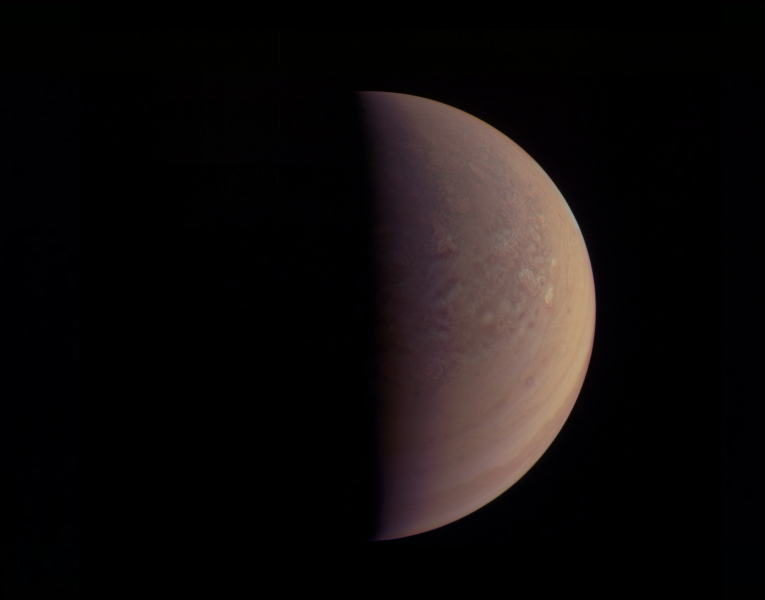
Enchanced and color balanced version :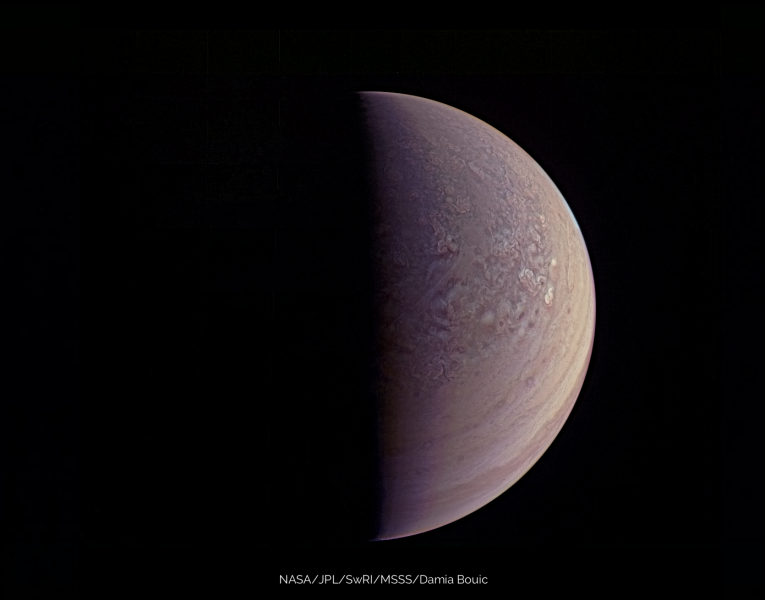
http://www.db-prods.net/blog/2016/09/01/quarter-of-jupiter-a-junocam-image/
I'm very curious about the imagery taken much more closer to Jupiter, and pretty afraid by the amount of work waiting for us…
Posted by: elakdawalla Sep 1 2016, 06:03 PM
Sorry, that text was confusing. It referred to the fact that they didn't take a blue-only frame at that time. I've changed the text to be clearer.
Posted by: Gerald Sep 1 2016, 07:55 PM
This 1-second fragment of part 7 of Marble Movie level 2, is sufficiently small, that I can post it here directly: juno_marble_jupiter_7b.avi ( 350.56K )
: 305
juno_marble_jupiter_7b.avi ( 350.56K )
: 305
The sequence is immediately before the larger Jupiter images begin.
I've supersampled the latter with 60°x60° and 120 pixels per degree in order to stay continuous with the small marble images. This drove my computer to the limits, and required about 8 minutes per frame.
Besides a few corrupted frames, level-2 Marble Movie parts 1 to 7 is completed. I'll upload this version in a few minutes as an AVI; it will show up on http://junocam.pictures/gerald/uploads/20160901/ in half an hour or so. EDIT: Upload completed, you may need to refresh your browser window.
I'll try to fix the remaining issues tomorrow.
Re tools: Learning means re-inventing. So I've written the whole JunoCam processing from scratch in C++, including developing the required math as far as it's not standard graduate, but except graphics file format conversion. Similar software may or may not exist elsewhere.
In the meanwhile, it's about 50 executables, and several MB of source code. This includes analysis and calibration software.
I'm expecting another two dozens or so tools still to be written to cover all calibration and processing I'm intending to perform with JunoCam images.
The software will likely not be released, in order to avoid multiple issues, like possibly conflicting professional obligations, legal and security issues, or documentation and support overhead.
However, I'll release processed JunoCam image products public domain as far as possible.
Posted by: xflare Sep 2 2016, 07:21 AM
If you let all the images on that page load and then scroll up and down it superfast - it turns into a kind of zoetrope movie !
Posted by: Gerald Sep 2 2016, 10:29 AM
A successful attempt! ![]()
---
Repaired (filled missing part with black to get full framelet triples), and level-1-processed image #6080:
I also found and fixed the software bug leading to occasional wrong planet identification and crop of the last part 7 Marble Movie image.
RGB Images #6068 to #6159 are undergoing reprocessing for the AVI, with the according CPU marathon over several hours.
Posted by: S_Walker Sep 2 2016, 04:00 PM
Here's my interpretation of frame JNCE_2016240_00C6159_V01.
Wow, thats a ton of work for one image!
I stuck with a straight RGB combine, and increased the saturation 15%. Corrected some distortions in Photoshop.
the right version uses multiple high-pass filter layers, also performed in Photoshop.
Sean Walker
Posted by: Gerald Sep 2 2016, 04:19 PM
https://www.youtube.com/watch?v=l8apkaqUF-k, and http://junocam.pictures/gerald/uploads/20160902/ now covering parts 1 to 7 in good quality. The rapid approach to Jupiter begins about 10 seconds before the end of the video.
Without warranty, I think, it's composed of 2890 level-2-processed JunoCam RGB images.
It's notified to the missionjuno site.
This has been quite some work, but probably easy compared to the processing of the close-ups of August 27 to come. So far this was doable without SPICE. So, my next step is preparing the SPICE trajectory for mangling into the processing, and implementing a spheroid version for the Jupiter model, instead of just using a spherical model as for Earth flyby.
Posted by: elakdawalla Sep 2 2016, 05:40 PM
http://www.unmannedspaceflight.com/index.php?showtopic=8236&hl=. The Marble Movie is going to continue for another orbit, so we'll keep this thread open for that.
Posted by: ugordan Sep 2 2016, 05:56 PM
Awesome work, Gerald!
Posted by: alan Sep 2 2016, 07:57 PM
Could the lack of banding at high latitudes be due to a different balance between energy from the sun and the internal heat released?
Posted by: mcaplinger Sep 2 2016, 08:18 PM
Nobody knows. It is known that Jupiter is roughly isothermal across latitudes even though there's more energy from the sun at the equator, which is already pretty weird. Obviously the poles have lower rotational speed, but it's not even known how deep the winds are.
"Dynamics of Jupiter's Atmosphere" by Andrew P. Ingersoll et al is a great place to start (if you need to write a bunch of image captions in a hurry, for example.
Posted by: tanjent Sep 3 2016, 08:01 AM
A screen grab from the video recently posted by Emily in her blog certainly shows the polar region as equally warm if not warmer, (at at least one specific wavelength and depth), as the average of warm and cool bands in the temperate regions. On Earth I never heard of aurorae raising the atmospheric temperature, but in Jupiter's supercharged environment could this be happening? Straightforward atmospheric mixing might help make the temperatures more uniform at different latitudes, but for the poles to actually be warmer than the tropics would seem to require a more imaginative explanation.
Posted by: Hungry4info Sep 3 2016, 09:54 PM
My understanding is that the darker zones represent clouds that are opaque to the wavelengths the camera is sensitive to. So it isn't that Jupiter is "cooler" there, but rather, there are higher altitude clouds present.
Posted by: Gerald Sep 12 2016, 10:19 PM
The three last pre-pj1 rgb marble movie images animated in 60 second steps per frame (level 1 reprojected directly from raws), hence 1500-fold time-lapse, covering 1.5 hours: jnc_mable_pre_pj1_c6155_c6157_c6159_v47.avi ( 609.65K )
: 257
jnc_mable_pre_pj1_c6155_c6157_c6159_v47.avi ( 609.65K )
: 257
Together with the pj1 images, it should be possible to cover most of the north polar region from marble movie images, although of varying quality.
Posted by: Gerald Sep 13 2016, 04:14 PM
A glimpse at the first 30 post-pj1 Marble Movie RGB images, level 1:
Posted by: elakdawalla Sep 13 2016, 06:11 PM
I *just* came here to point out that post-PJ1 Marble Movie images had been posted, and see that you beat me to them, Gerald ![]() The last image in the archive is from September 3. I'll work on downloading....
The last image in the archive is from September 3. I'll work on downloading....
Posted by: Gerald Sep 13 2016, 08:00 PM
The test run of the part 8 drafts has been with the parameters derived from images at the end of part 6.
But I see a small misalignment. So I'm running a new calibration with images of end of part 8.
The small offset might be fully explainable by the simplified camera model I'm using for the marble movie images.
Whatever the root cause, assuming a spinup during PJ1 by 0.25% returns better results. No idea, whether that's real, by kind of aerobreaking, some thrust, HGA motion, or just a model artifact.
While I'm processing the images with adjusted parameters, here a manually enhanced version of this second run, showing the Great Red Spot, and a nice shadow, possibly with umbra and penumbra distinguishable:
(credit: NASA / JPL / SwRI / MSSS / Gerald Eichstädt)
I'd think, that I'll be able to provide the full set of part 8 and part 9 rgb level 1 thumbnails within the next about 4 hours.
Edit: sorry, this post has been intended for the Marble Movie thread. [FIXED. --MOD.]
Posted by: Gerald Sep 13 2016, 10:25 PM
http://junocam.pictures/gerald/uploads/20160913/.
I'll first work on level 2. After that, I might re-render the level 1 images where Jupiter has been too large to fit.
Posted by: elakdawalla Sep 13 2016, 11:45 PM
Thanks! Thumbnails now added to my https://planetary.s3.amazonaws.com/data/juno/junocam_marble.html.
Posted by: Gerald Sep 14 2016, 01:45 AM
Hi Emily, there is a residual inconsistence between the link to the processed pngs
and the actual respective file name
for parts 8 and 9.
-------
Level 2 images look good. I'm going to assemble them.
Posted by: Gerald Sep 14 2016, 04:12 AM
http://junocam.pictures/gerald/uploads/20160914/, stills and AVI animation, including a synopsis of the 40 first Marble Movie images after PJ1.
https://www.youtube.com/watch?v=G6Ky6W167Vs&feature=youtu.be, pre-, and post-PJ1.
Posted by: Gerald Sep 15 2016, 10:11 PM
http://junocam.pictures/gerald/uploads/20160915/, as zips, and as online browsable version. Some of those images have been cropped in previous renditions.
Part 7 images have been supersampled about 4-fold, part 8 supersampled about twice.
Posted by: Brian Burns Sep 15 2016, 10:55 PM
https://www.youtube.com/watch?v=G6Ky6W167Vs&feature=youtu.be, pre-, and post-PJ1.
These are cool.
Would it be possible to have them slow down near closest approach also, so you could see the details (as in the earlier animation you made)?
I've been using ffmpeg to assemble movies, and had to adjust the frame rate by adding duplicate frames - the number of copies of a frame is based on the size of the target times a constant, with some limit, which seemed to work fairly well. It's less realistic of course, but it lets you see the detail in the images, and speeds past the more distant images. I had to use mklink (on Windows) to make symbolic links so I didn't run out of space on my hard drive with thousands of copies...
Posted by: Gerald Sep 15 2016, 11:34 PM
I've already done so with a few Marble Movie images close to PJ1, also with ffmpeg (see http://www.unmannedspaceflight.com/index.php?showtopic=8226&view=findpost&p=232636), and I'm currently working on the second external 2TB HD drive.
But I've not yet included Jupiter's oblateness and axis obliquity. Trajectory data are in J2000 like Earth's axis, and Earth is almost spherical, so these two effects didn't need to be considered for Earth. I'm working on both effects, first axis obliquity.
Posted by: Gerald Sep 19 2016, 12:51 PM
The method I'm using to retrieve axis obliquity seems to return reasonable results now:  mable_pre_pj1_c6157_c6159_51_out.avi ( 610.38K )
: 202
mable_pre_pj1_c6157_c6159_51_out.avi ( 610.38K )
: 202
It uses pointing vectors from Jupiter to Earth and Sun in JUPITER_IAU and J2000 frames of SPICE trajectory data as obtained via spy.exe to calculate the change of base transformation, which has been missing before. I'm using two vector pairs for a fixed instant to calculate Jupiter's axis. Jupiter's assumed angular velocity is some estimate near 2pi / 9h50m expressed in units of JunoCam's interframe delay of about 0.38s.
Jupiter's yet unconsidered oblateness is likely to contribute most of the remaining inaccuracy. I'm working on fixing this.
Posted by: Gerald Sep 19 2016, 07:13 PM
JunoCam http://junocam.pictures/gerald/uploads/20160919/.
Part 10 covers September 4 to September 10, 2016.
Posted by: Gerald Sep 20 2016, 05:38 PM
John Rogers at the https://www.britastro.org/node/7982 provides an enhanced and annotated version of the https://www.missionjuno.swri.edu/junocam/processing?id=173 and https://www.missionjuno.swri.edu/junocam/processing?id=174.
Posted by: Gerald Sep 23 2016, 09:37 PM
http://junocam.pictures/gerald/uploads/20160923/.
The sequence starting at image #7913 required some parameter adjustment, therefore I've split part 11 in two zip files with a slightly different naming convention (substrings '11', resp. '11a').
Rendering of level 2 images for AVI update is running.
I'll add the video update to the same URL later today, I'd think less than an hour from now, and edit this post accordingly.
Edit: The AVIs are uploaded. Part 11 is split into two fragments, and I've provided the full sequence from parts 1 to part 11.
Part 11 covers September 11 to 17, 2016.
Posted by: Gerald Sep 26 2016, 02:18 PM
For a seamless animation of rendered JunoCam images near PJs, to be able to look for, or to measure changes, or to create good map products, I'll need to model Jupiter as a spheroid. Thus far I've implemented only a sphere.
One of the core capabilities is intersecting a line with the target object. Until recently, I didn't find the time to write up these geometric basics as a pdf document. But now, as things are going to get more complex, it became necessary to do so.
 junocam08_basic_geometry_I.pdf ( 565.69K )
: 737
junocam08_basic_geometry_I.pdf ( 565.69K )
: 737
I'm now going to implement the spheroid part.
Posted by: FOV Sep 26 2016, 08:56 PM
I just watched the marble movie with headline banner "Citizen Science: Juno Fan Creates Movie of Spacecraft's Approach to Jupiter" on the NASA web site home page. I really enjoyed it. Great stuff.
Posted by: elakdawalla Sep 27 2016, 07:55 PM
These are, belatedly, posted on https://planetary.s3.amazonaws.com/data/juno/junocam_marble2.html.
Posted by: mcaplinger Sep 27 2016, 09:47 PM
See SPICE toolkit function surfpt for the triaxial ellipsoid implementation.
Posted by: Gerald Sep 28 2016, 04:55 PM
Thanks! I thought, I've seen it somewhere in SPICE.
But I'm expecting the need to extend it to a model of a dynamical cloud top (and possibly some rudimentary extension towards https://en.wikipedia.org/wiki/Polytrope) to improve the predictive capabilities, and I might require the derivatives for approximation methods.
So I think, I'd better understand the inside of the black box.
Posted by: xflare Sep 30 2016, 09:44 AM
I haven't been able to find the Dates and Times of the upcoming Perijove close approaches, does anyone have them?
Posted by: Phil Stooke Sep 30 2016, 12:09 PM
Not times, but dates:
http://www.planetary.org/blogs/emily-lakdawalla/2016/06090600-what-to-expect-from-junocam.html
(just go to the Planetary Society website and enter 'juno' in the search box)
Phil
Posted by: mcaplinger Sep 30 2016, 06:46 PM
These were accurate at one time, I haven't checked them lately but they should be pretty close. Times in UT, obviously.
orb[ 1] = "27-AUG-2016 12:51:20"
orb[ 2] = "19-OCT-2016 18:11:07"
orb[ 3] = "02-NOV-2016 17:52:29"
orb[ 4] = "16-NOV-2016 16:54:46"
orb[ 5] = "30-NOV-2016 15:52:21"
orb[ 6] = "14-DEC-2016 14:49:58"
orb[ 7] = "28-DEC-2016 13:47:35"
orb[ 8] = "11-JAN-2017 13:59:37"
orb[ 9] = "25-JAN-2017 12:57:12"
orb[ 10] = "08-FEB-2017 11:54:47"
orb[ 11] = "22-FEB-2017 10:52:21"
orb[ 12] = "08-MAR-2017 09:12:44"
orb[ 13] = "22-MAR-2017 08:10:19"
orb[ 14] = "05-APR-2017 07:07:53"
orb[ 15] = "19-APR-2017 06:05:27"
orb[ 16] = "03-MAY-2017 06:17:26"
orb[ 17] = "17-MAY-2017 05:14:57"
orb[ 18] = "31-MAY-2017 04:12:29"
orb[ 19] = "14-JUN-2017 03:10:03"
orb[ 20] = "28-JUN-2017 03:40:40"
orb[ 21] = "12-JUL-2017 02:38:12"
orb[ 22] = "26-JUL-2017 01:35:46"
orb[ 23] = "09-AUG-2017 00:33:19"
orb[ 24] = "23-AUG-2017 00:08:07"
orb[ 25] = "05-SEP-2017 23:05:44"
orb[ 26] = "19-SEP-2017 22:03:21"
orb[ 27] = "03-OCT-2017 21:00:55"
orb[ 28] = "17-OCT-2017 20:35:43"
orb[ 29] = "31-OCT-2017 19:33:14"
orb[ 30] = "14-NOV-2017 18:30:45"
orb[ 31] = "28-NOV-2017 17:28:16"
orb[ 32] = "12-DEC-2017 17:02:53"
orb[ 33] = "26-DEC-2017 16:00:20"
orb[ 34] = "09-JAN-2018 14:57:50"
orb[ 35] = "23-JAN-2018 13:55:18"
orb[ 36] = "06-FEB-2018 12:52:47"
orb[ 37] = "20-FEB-2018 11:39:44"
Posted by: Gerald Oct 6 2016, 05:29 PM
The implementation of the (rigid) spheroid model seems to be roughly ok now. Some model parameters may need further refinement.
Here one of my according attempts (still with some additional manual registering) to cover Jupiter's north polar region seen from about the position of the first PJ1 image (close to above the north pole):
(credit: NASA / JPL / SwRI / MSSS / Gerald Eichstädt)
Three of the images are from "Marble Movie", one is PJ1.
I'm trying to cover the remaining quarter, too, but think I've still an unresolved issue for this latter part.
Since the same part of Jupiter looks different from different perspective, it's not always obvious where discrepancies come from.
Btw. http://www.dailymail.co.uk/sciencetech/article-3813887/Journey-Jupiter-Watch-end-Juno-s-five-year-mission-gas-giant-stunning-time-lapse.html happened to combine two different identities to a plausible, but non-existent phantom, with others copy-pasting it. So I can continue working undisturbed thus far.
Posted by: Gerald Oct 7 2016, 08:24 PM
http://junocam.pictures/gerald/uploads/20161007/, pre- and post-solar conjunction, level 1 stills, avi part 12, and avi parts 1-12.
Quality of my post-conjunction processing seems almost, but not quite perfect. I'll run a recalibration, if someone complains.
Posted by: Gerald Oct 8 2016, 04:03 PM
One of the pre-PJ1 Marble Movie images reprojected (displayed in spherical coordinates, therefore the rounded square-like appearance) to about 21 minutes before closest approach, and enhanced:
Images like this might eventually provide context for the PJ1 images.
The image is an enhanced crop of a still of a preliminary animation. Resolution is 10 pixels/degree.
Posted by: Gerald Oct 11 2016, 01:59 AM
Exploring the surface coverage of selected Marble Movie (near PJ1) and PJ1 images:
(cylindrical map with some longitude overlap)
Posted by: Gerald Oct 12 2016, 02:16 PM
Context map for PJ1, southern hemisphere, composed of 20 map-projected Marble Movie images, enhanced:
http://junocam.pictures/gerald/uploads/20161012/marble_pj1_south_map_first20_postPJ1_rot90.png
...working on northern hemisphere...
Posted by: mcaplinger Oct 12 2016, 03:30 PM
That's really nice. It would be more scientifically useful if you presented it in a standard cylindrical map projection (no duplication) and defined the coordinate system (central longitude, which longitude system, latitudes planetographic or planetocentric, etc.) And identifying which images were used would be helpful.
Posted by: Gerald Oct 12 2016, 05:55 PM
Thanks! And thanks for guidance!
I'm trying to complete the full surface coverage before tomorrow in the evening. Then I'll likely be offline until Sunday evening. Might be, that finishing will last until after the weekend, but I'm open to additional requirements.
Scale is 10 pixels / degree in this rendition, longitude and latitude, equator in the y-center, latitude range [-90°;+90°].
Accuracy not yet known exactly, probably near 1°.
Some of your suggestions have already been on my list, just not yet completed. The underlying images for the southern hemisphere are the first 20 Marble Movie images after PJ1, but I'll likely provide all partial maps, too, for better reproducibility.
I'm aware of the GRL deadline.
Posted by: Gerald Oct 13 2016, 04:08 AM
http://junocam.pictures/gerald/uploads/20161012/jnc_p1_marble_map_southern20161012.zip, at least.
Coordinates should be approximately planetocentric (rendition observer sitting at Jupiter's center with a spherical coordinate system looking to a Jupiter-spheroid), co-rotating in a rigid way with some surface feature in the overlap between first and last map of the sequence. The attitude transformation between the frames (JunoCam and Jupiter) is inferred from a fixed instant of four SPICE trajectory dumps, hence from two vector pairs, each completed to a basis by the respective vector product. And there may be some rotation offset due to the chosen instant of rendition. The effect on the zero meridian is TBD.
Posted by: Gerald Oct 13 2016, 04:35 PM
Preliminary full surface coverage around PJ1, derived from the 40 nextmost Marble Movie RGB images (20 before and 20 after PJ1), reduced to 0.2x0.2 lon/lat planetocentric degree squares:
http://junocam.pictures/gerald/uploads/20161013/merge_map_JNCE_2016240_00C6121_to_C6159_and_C6189_to_C6227_mult_negVMeanGrey_div128_hipass100_rot90_linstretch_sat.png.
http://junocam.pictures/gerald/uploads/20161013/merge_map_JNCE_2016240_00C6121_to_C6159_and_C6189_to_C6227_rot90.png
http://junocam.pictures/gerald/uploads/20161013/map_files_marbleMovie_nearPJ1_20161013.zip.
Some of the partial maps may be higher resolved then the corresponding merged map due to overlap with lower-resolved image.
As of now, I can't rule out some shear or displacement/mis-alignment.
I'll hopefully be able to provide a somewhat refined and appropriately cropped 360°x180°-version early next week.
Posted by: Gerald Oct 15 2016, 06:52 AM
Regarding the changes of the planning, it's maybe better to provide another intermediate version of the global map around PJ1:
Some mis-alignments are reduced. You'll get an idea of the inaccuracies of the previously posted map, but the version is still not perfect.
The map is post-processed by a 0-th de-lamberting (dividing by sqrt(cos(y))), and roughly squared.
Currently I've only a reduced communication bandwidth.
Posted by: Gerald Oct 18 2016, 08:13 PM
http://junocam.pictures/gerald/uploads/20161018/, covers 2016-10-02 to 2016-10-08.
I've added revised level 1 stills of part12, since best-fit parameters changed a bit after solar conjunction.
Btw.: Tomorrow there will be a Juno press conference:
https://www.nasa.gov/press-release/nasa-s-juno-team-to-discuss-jupiter-mission-status-latest-science-results
Posted by: Gerald Oct 20 2016, 01:59 PM
Hi Mike, could you please pre-release the latest available raw Marble Movie images before PJ2, asap, particularly the CH4? Metadata aren't essential. There appear to take place significant changes on Jupiter right now.
Posted by: Gerald Oct 21 2016, 04:21 AM
Thanks a lot!
http://junocam.pictures/gerald/uploads/20161021/, RGB and methane band.
I see the GRS in the methane images, but no obvious hint towards the recently discovered bright IR features.
Posted by: Gerald Oct 21 2016, 09:28 AM
I barely dare to ask, whether JunoCam has been powered on between October 15 and 19, and whether it has taken images during this time, after the decision to postpone the PRM, and before the PJ2 safe mode event. But I'm almost sure, that it won't take a day, before I'll be asked the very same question.
Posted by: mcaplinger Oct 21 2016, 02:15 PM
Nope, we didn't get to the first image before the s/c safed.
Posted by: Gerald Oct 21 2016, 10:50 PM
Here 20 http://junocam.pictures/gerald/uploads/20161021/marble_movie_part7_selected_ch4/index.html:
Maybe it's possibe to find, or to rule out, an early state of the new features in the methane images near PJ1.
Posted by: Gerald Oct 22 2016, 10:45 AM
http://junocam.pictures/gerald/uploads/20161022/last_marble_movie_rgb_level1/index.html, covering about two Jupiter days.
The next sequence of images has been scheduled to get a different name, but with the postponed period reduction maneuver (PRM) we'll see.
Posted by: Gerald Oct 23 2016, 10:15 PM
http://junocam.pictures/gerald/uploads/20161023/, the whole scheduled sequence from PJ0 to PJ2, skipping PJ1 close-ups, is available as level-2 processed AVI animation (about 32 MB), and also as a MOV version (about 350 MB), converted from the AVI. A small number of frames are omitted.
I've provided a few additional short 14-image animated gifs with strongly motion-enhanced stills, time-lapsed with about 10 hours per frame, covering the week of part 14, differently shifted in rotational phase. Those are intended for Jupiter experts, who try to see effects of the recent outburst.
Posted by: Gerald Oct 30 2016, 08:22 AM
I've uploaded the https://www.youtube.com/watch?v=B2kTiMpphBs. It's almost all Marble Movie RGB images between PJ0 and PJ2.
And https://www.youtube.com/watch?v=5GwFx3QHX00, each still a weighted mean of reprojections of two mostly consecutive JunoCam images, 20 Marble Movie images, and one PJ1 image. The PJ1 image is #C6162, hence skipping the longer-exposed #C6160 of similar perspective. The stills are square-root encoded like the raws, but with linear weights for the color channels to get closer to the "real" colors.
I've submitted both videos to the missionjuno site.
Posted by: Gerald Nov 10 2016, 06:20 PM
http://junocam.pictures/gerald/uploads/20161110/delamberting01.html.
Posted by: Gerald Nov 14 2016, 12:24 PM
http://junocam.pictures/gerald/uploads/20161114/SelectedDeLambertedPartialMapsNearPJ1_Draft.html (40 Marble Movie images, and 3 PJ1 images, including the one already processed before), north to the right. I've also provided the square-root encoded version (without de-lamberting), and the applied approximate de-lamberting mask.
These drafts bring out quite some detail. But they show various issues, too. I'll pick out some color calibration, first.
Edit: Crops of #6180 and #6189:
(Credit: NASA / JPL / SwRI / MSSS / Gerald Eichstädt)
I'm inclined to see dynamics beyond possible errors in the map projections.
(Images have been taken around 13:19 and 19:15 on 2016-08-27.)
Posted by: Gerald Nov 23 2016, 05:40 PM
This is an attempt to check for subtle changes between images #6159 and #6160, the transition from the Marble Movie sequence to PJ1:
(Credit: NASA / JPL / SwRI / MSSS / Gerald Eichstädt)
The frames are crops of approximately de-lamberted and enhanced (by 4th power) map-projections, north to the right.
Posted by: avisolo Jan 31 2018, 11:21 PM
Dear Gerald,
Please find my "creative" take on the JunoCan Marble Movie here:
https://vimeo.com/253700363
Thanks again for all your efforts on our behalf,
Avi
Posted by: Gerald Jan 31 2018, 11:36 PM
Thanks Avi, for your video, and for reminding us, that the Marble Movie images still bear potential to be uncovered!
Powered by Invision Power Board (http://www.invisionboard.com)
© Invision Power Services (http://www.invisionpower.com)
